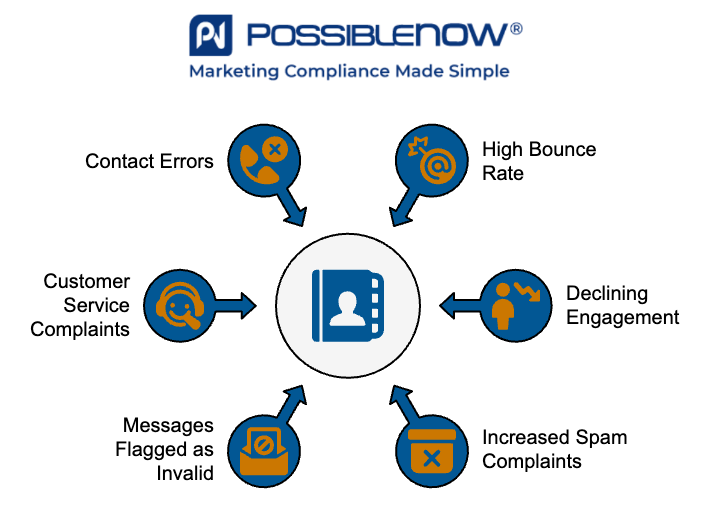Resource Center
How Often Should Marketers Scrub Their Contact Lists?
Type: Blog
Topic: Do Not Call Solution

Scrubbing your contact list is not only a compliance requirement but also helps reduce bounce rates, avoid wasted outreach, and protect your brand’s credibility. How often you should scrub your list depends on how you’re managing contacts. For marketers using traditional or batch-based tools, the answer is measured in days or weeks. For those using real-time suppression tools, such as DNCSolution® and MyPreferences® from PossibleNOW, updates can be applied automatically each time a contact is used.
Outdated data not only creates campaign inefficiencies but also exposes your organization to regulatory penalties under the Telephone Consumer Protection Act (TCPA) and the FTC’s Telemarketing Sales Rule (TSR).
Here are some key recommendations for keeping contact data clean and compliant:
- Scrub active or fast-changing lists at least monthly if using manual methods
- Remove bounced addresses, unsubscribes, and unengaged contacts regularly
- Cross-check phone numbers against the National Do Not Call Registry and your internal DNC list
- Apply opt-outs and consent changes across all channels, not just where they originated
- Use real-time suppression tools that automatically apply opt-outs
In the following sections, you’ll find information on:
- 6 Signs It’s Time to Scrub Your Contact Lists
- How to Keep Contact Lists Updated in Real Time
- About PossibleNOW
Speak With an Expert Today
6 Signs It’s Time to Scrub Your Contact Lists

It’s not always obvious when your contact data is out of date, but certain indicators signal that your list may be putting your outreach and compliance at risk:
1. Bounce rate exceeds 2 percent
A rising number of hard bounces signals invalid or inactive email addresses. This not only damages sender reputation but can also trigger filtering by email providers, reducing overall deliverability.
2. Declining open and click-through rates
If engagement metrics are trending downward across campaigns, it may be a sign that recipients no longer recognize your brand or that the list includes unresponsive contacts who should be removed.
3. Increased spam complaints or unsubscribes
Higher complaint rates suggest your messages are being seen as irrelevant, repetitive, or unwanted. This can result in deliverability issues and, over time, lead to blacklisting by inbox providers.
4. Messages flagged as invalid by carriers or ESPs
When phone carriers or email service providers flag messages as undeliverable or suspicious, it often reflects poor data hygiene—especially with mobile numbers that have been reassigned or email accounts that no longer exist.
5. Complaints to customer service about unwanted outreach
Hearing from customers that they received messages they thought they had opted out of is a red flag. This can indicate that opt-outs are not being properly captured or applied across systems.
6. Frequent contact errors in phone or SMS campaigns
Invalid numbers, carrier rejections, or regulatory blocks during outbound calls and texts often point to outdated phone data. These issues can lead to fines if messages are sent without proper consent.
Consequences of Using Outdated Contact Lists
Poor list hygiene can be both financially and reputationally costly. Under the TCPA, marketers face fines of $500 to $1,500 per unauthorized message, especially for calls or texts sent without valid consent. The TSR requires businesses to honor Do Not Contact requests and maintain an internal suppression list. Violating these rules, even unintentionally, can result in regulatory actions and lawsuits.
Beyond compliance risk, outdated lists waste marketing spend, lower engagement, and erode customer trust. Delivering irrelevant or repetitive messages to someone who has opted out not only breaks the rules but damages long-term brand value.
How to Keep Contact Lists Updated in Real Time
For marketers who want to move beyond manual scrubbing, real-time list hygiene is both possible and practical with the right technology. PossibleNOW’s Do Not Call solution automates contact validation and suppression at the point of use.
With our advanced DNCSolution platform, contact records are checked against internal suppression files, the National Do Not Call Registry, and other regulatory databases in real time. This eliminates the need for periodic list sweeps and helps maintain compliance with TCPA and TSR rules on every campaign.
When paired with MyPreferences, marketers can centralize consent across channels, capturing opt-outs as they happen and applying them consistently across phone, email, SMS, and even mail. This real-time integration helps reduce risk while improving customer experience and data accuracy.
PossibleNOW also provides dedicated TCPA compliance services that help organizations apply the law correctly, monitor changes in customer status, and maintain defensible audit trails.
To reduce risk and improve campaign performance, marketers should stop relying on scheduled cleanups and start using tools that keep contact data compliant the moment it’s used. Talk to us about automating contact list hygiene across your organization.
Request a Demo Today
About PossibleNOW
PossibleNOW is the pioneer and leader in customer consent, preference, and regulatory compliance solutions. We leverage our MyPreferences technology, processes, and services to enable relevant, trusted, and compliant customer interactions. Our platform empowers the collection, centralization, and distribution of customer communication consent and preferences across the
enterprise. DNCSolution addresses Do Not Contact regulations such as TCPA, CAN-SPAM and CASL, allowing companies to adhere to DNC requirements, backed by our 100% compliance guarantee.
PossibleNOW’s strategic consultants take a holistic approach, leveraging years of experience when creating strategic roadmaps, planning technology deployments, and designing customer interfaces. PossibleNOW is purpose-built to help large, complex organizations improve customer experiences and loyalty while mitigating compliance risk.
-
TCPA Regulations and Compliance: Complete Guide
Type: Blog
Topic: Do Not Call Solution
-
Defining Meaningful Metrics: 6 Soft KPIs to Measure Customer Preference Collection
Type: Blog
Topic: Preference Mgmt
-
Email Preference Center Best Practices
Type: Blog
Topic: Preference Mgmt
-
The Basics of DNC Scrubbing: What Is a Do Not Call (DNC) Scrubber and Why Do You Need It?
Type: Blog
Topic: Do Not Call Solution
-
What is Consent Management, How it Works, & Why it’s Important for Data Compliance
Type: Blog
Topic: Consent Mgmt
-
Do Insurance Companies Cover TCPA Damages?
Type: Blog
Topic: Do Not Call Solution
-
8 Best Practices for Capturing GDPR Consent
Type: Webinars
-
Data Silos Cause Communication Gaps
Type: Videos
Topic: Preference Mgmt
-
Difference Between Preferences & Consent
Type: Videos
Topic: Preference Mgmt
-
Integrate Do Not Call Compliance with Preferences
Type: Videos
Topic: Preference Mgmt
-
Customer Preferences Require More Than One Flavor
Type: Videos
Topic: Preference Mgmt
-
Give Customers Opt-Down Options
Type: Videos
Topic: Preference Mgmt
-
Preference Center Organization
Type: Videos
Topic: Preference Mgmt
-
Strategic Consultants Benefited Scotiabank
Type: Videos
Topic: Industry Testimonials
-
Best Practices for Managing Do Not Email Lists
Type: Blog
Topic: Do Not Call Solution
-
How Do Not Call Rules Apply to Nonprofit Organizations
Type: Blog
Topic: Do Not Call Solution
-
How to Train Your Call Center on DNC Rules
Type: Blog
Topic: Do Not Call Solution
